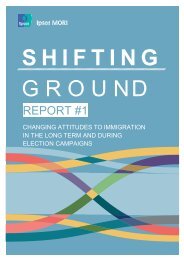You also want an ePaper? Increase the reach of your titles
YUMPU automatically turns print PDFs into web optimized ePapers that Google loves.
Prosecution Service later secured convictions against Izzadeen on charges of<br />
‘fundraising for terrorism and inciting terrorism overseas’. 293<br />
That kind of exclusionary mentality – ‘us’ and ‘them’ – promoted by men like Abu<br />
Izzadeen and Parviz Khan has ensured <strong>that</strong> being a Muslim in the British armed<br />
forces has become an exceedingly contentious matter. The issue came to a head<br />
when Lance-Corporal Jabron Hashmi was killed fighting the Taliban in Helmand<br />
province in 2006. The battle for his legacy was fiercely contested from the outset.<br />
A short distance from the terraced home where Hashmi grew up in a working class,<br />
inner-city part of Birmingham, a visiting imam at a local mosque railed against him.<br />
‘There was an individual who was killed in Afghanistan recently – what was his name?<br />
His name was a Muslim name you know what they’d written in a tabloid newspaper?<br />
“Hero of Islam”! “Hero of Islam” who went into the Muslim Afghanistan to kill<br />
Muslims. Why? Because their [the Taliban] crime is implementing Islam’, he told the<br />
congregation, ‘The hero of Islam is the one who <strong>sep</strong>arated his head from his<br />
shoulders’. 294<br />
While making a film for More 4 News (a sister production of Channel 4 News)<br />
in 2007, I interviewed Shah Jalal Hussain, an associate of Abu Izzadeen’s, about his<br />
feelings towards Jabron Hashmi and Parviz Khan’s plot. Hussain refused to<br />
condemn the beheading conspiracy and told me he believed Jabron Hashmi would<br />
be punished in hell as an apostate and traitor to Islam. Invoking Islamic ideas of<br />
purgatory, he said: ‘I believe [Hashmi] is being punished in his grave right now’. 295<br />
The views expressed by men like Abu Izzadeen and Hussain are not just a<br />
challenge to those who join the armed forces. During an extensive interview<br />
Hussain also told me <strong>that</strong> any Muslim who joined the police force or intelligence<br />
services also ran the risk of apostasy and <strong>that</strong> he wanted to ostracise them from<br />
the community – including forcibly ejecting them from mosques. Izzadeen was<br />
filmed echoing similar sentiments when he railed:<br />
If the police come to your house, whoever killed them, he has no blame on his neck because he<br />
defended his awrat [modesty], his wife. So, are you gonna [sic] spy on the Muslim, for them to<br />
break down the house of your brother, and arrest him and his wife? Is <strong>that</strong> Islam? ...Stay far<br />
from the Jews, from the Hindus, the Sikhs, the kaffir [infidels] and be allied to the Muslims. 296<br />
Views like these are often inextricably intertwined with a wider Islamist<br />
worldview <strong>that</strong> seeks to alienate Muslims from wider society by preaching<br />
exclusivity and isolation. Indeed, the unspoken corollary is <strong>that</strong> those who<br />
support the state’s uniformed services are being disloyal to Islam and have<br />
committed a mortal heresy, punishable by death.<br />
Those views can sometimes spill over into more than just theoretical<br />
discussion. The Crown Prosecution Service said <strong>that</strong> Izzadeen had ‘called for<br />
people to fight the British, the American, the Japanese all of America's allies in Iraq<br />
and Afghanistan...He then calls for people to fight with their money, prepare the<br />
jihad, and sponsor the Mujahideen’. 297 In 2008, both Hussain and Abu Izzadeen,<br />
along with four other men, were convicted on assorted charges of fundraising for<br />
terrorism and inciting terrorism overseas. 298<br />
The main theological infrastructure which inspires such thinking comes from<br />
the Salafi-Wahhabi doctrine known as al-Walaa wal-Baraa. There is no precise<br />
translation into English of this term although one of the most authoritative<br />
Bri�sh Muslims and Barriers to Entering the Armed Forces<br />
293 Ibid.<br />
294 Transcript from ‘Undercover<br />
Mosque’ supplied by Hardcash<br />
Producations, producers of<br />
‘Undercover Mosque’ for Channel<br />
4, Dispatches.<br />
295 Author interview with Shah<br />
Jalal Hussain, East London, 2007.<br />
This interview was broadcast on<br />
More4 in 2007. The interview is<br />
available at:<br />
http://mp.channel4.com/more4/<br />
news/news-opinionfeature.jsp?id=529<br />
296 A copy of this video recording<br />
is in Policy Exchange’s possession.<br />
The comments made by Hussain<br />
were broadcast in Shiraz Maher’s<br />
film for More4 News in 2007.<br />
297 http://web.archive.org/web/<br />
20080829164700/http://www.cp<br />
s.gov.uk/publications/prosecution<br />
/violent_extremism.html#<strong>11</strong><br />
298 Ibid.<br />
policyexchange.org.uk | 65



